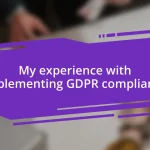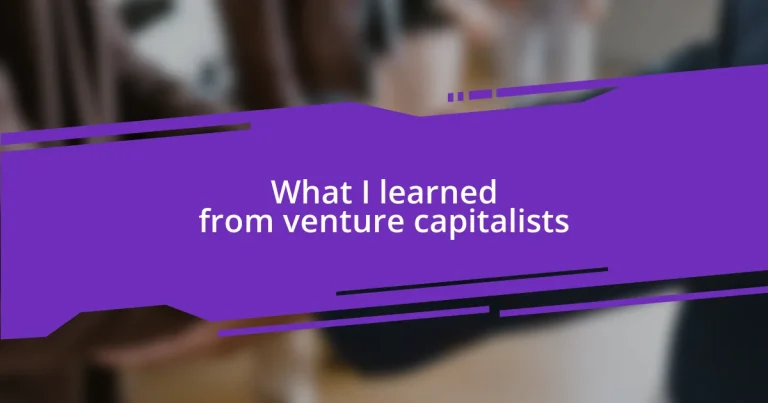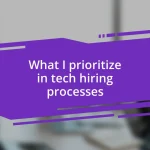Key takeaways:
- Resilience and belief in vision are crucial for overcoming setbacks in entrepreneurship.
- Building genuine relationships and effective networking can lead to valuable opportunities and insights.
- Successful startup evaluation requires understanding team dynamics, market fit, and financial sustainability.
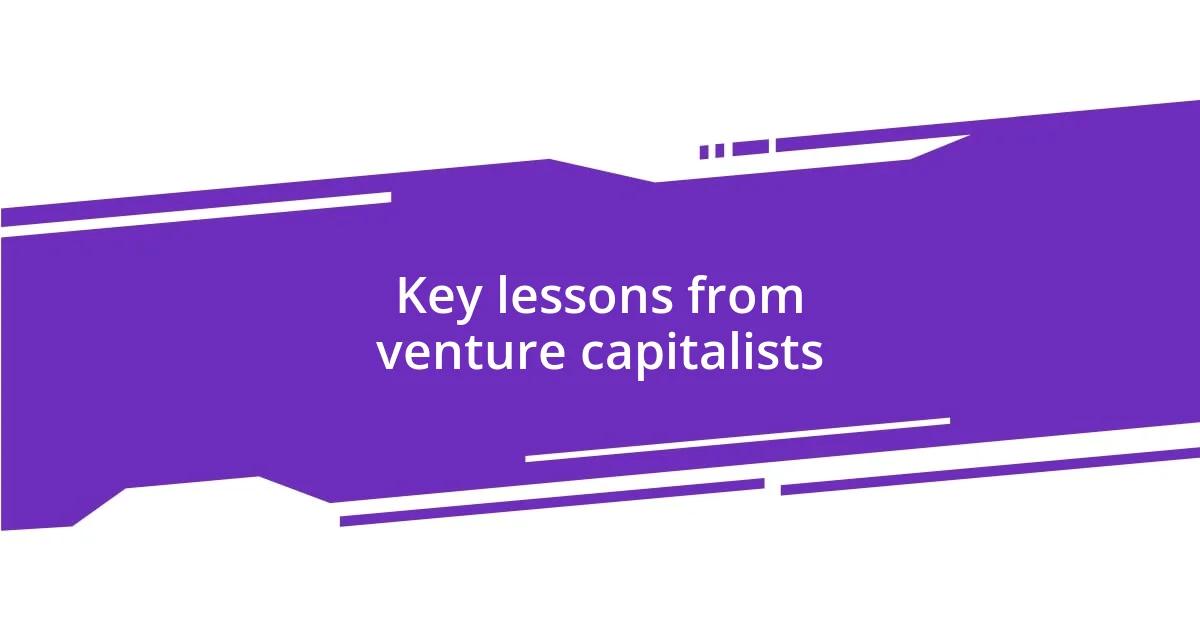
Key lessons from venture capitalists
One of the most striking lessons I learned from venture capitalists is the importance of resilience. I remember a pitch where the entrepreneur had faced numerous setbacks yet still radiated passion. It struck me: how do some people keep going when the odds are against them? It’s because they believe in their vision, and that unwavering belief can be the difference between failure and success.
Another key lesson revolves around the value of building relationships. I once attended a networking event where I saw a seasoned VC genuinely engaging with entrepreneurs, asking questions that went beyond their businesses. It made me realize that connections are more than just transactional; they’re about trust and mutual growth. Have you ever noticed how the strongest partnerships often start with a simple conversation?
Additionally, I gained insight into the significance of focusing on the right metrics. I recall a discussion with a venture capitalist who emphasized that growth isn’t just about revenue but also about user engagement and retention. This perspective changed how I evaluate success; it’s essential to look beyond surface-level numbers to understand the underlying health of a business. Isn’t it fascinating how sometimes, the most valuable lessons are hidden in the details?
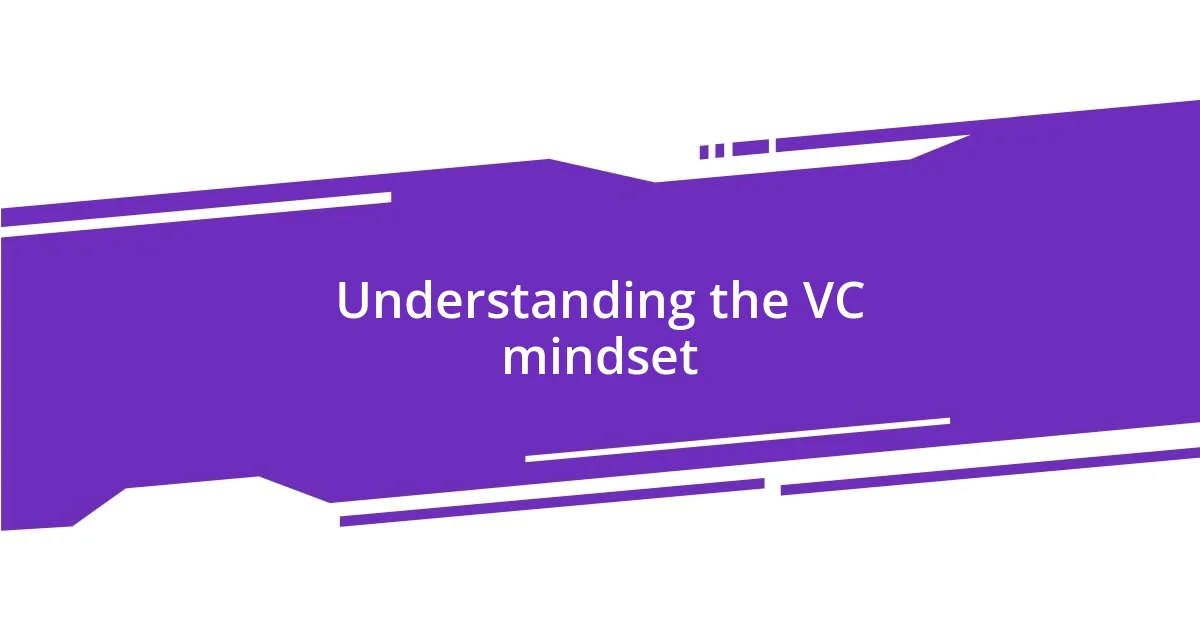
Understanding the VC mindset
Understanding the mindset of venture capitalists has been an enlightening journey for me. I’ve realized that their approach is grounded in a unique blend of analytical thinking and emotional intelligence. During a panel discussion, I found myself captivated by a VC’s perspective on risk. They shared a story about investing in a startup that seemed on the verge of collapsing. Most would have run for the hills, but this VC saw potential where others didn’t. It was a powerful reminder that a willingness to embrace uncertainty can sometimes lead to the most rewarding outcomes.
To truly grasp the VC mindset, consider these key aspects:
- Risk Assessment: VCs often analyze potential risk versus reward, understanding that every investment comes with uncertainty.
- Long-term Vision: Their focus is not just on immediate gains but also on the sustainability and growth trajectory of a startup over time.
- Adaptability: They adapt their strategies based on market trends, showing a willingness to pivot when necessary.
- Passion for Innovation: An underlying passion for innovative ideas drives their decisions, as they seek to support founders who are disrupting the status quo.
- Data-Driven Decisions: VCs prioritize data, utilizing metrics to inform their investment choices while still allowing room for intuition and gut feelings.
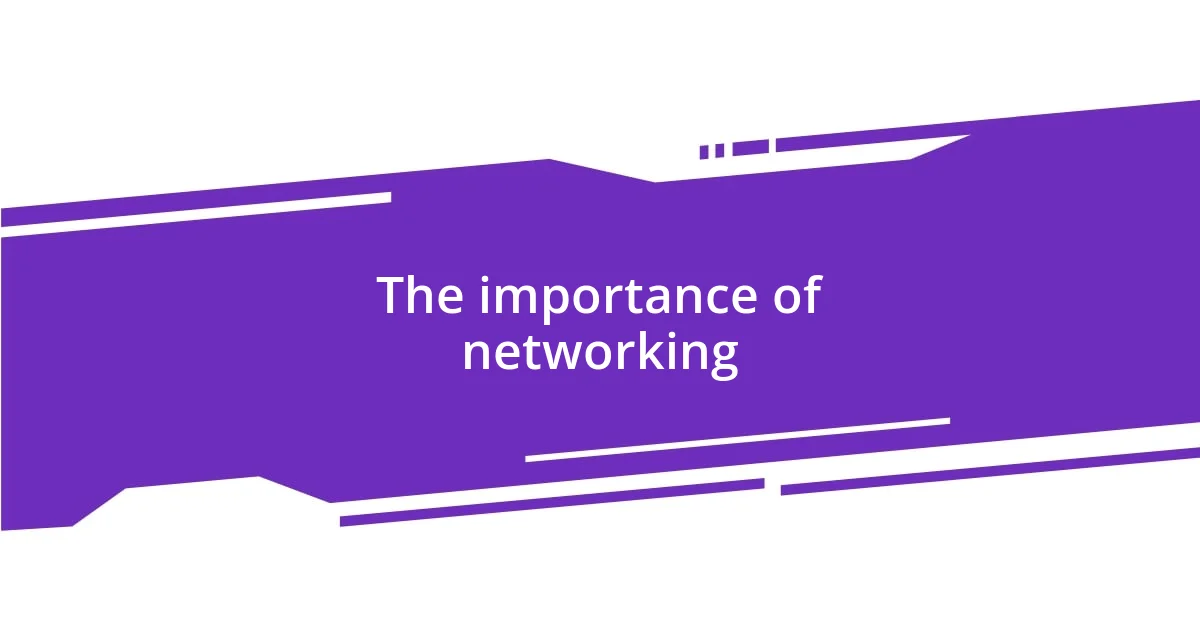
The importance of networking
Networking is not just a buzzword; it’s an essential part of the venture capital world. I vividly remember my first industry conference; it was overwhelming yet exhilarating. I realized that each conversation I had could lead to potential partnerships or invaluable insights. It’s fascinating how a simple exchange can open doors that were previously locked. Have you ever felt that moment when a new connection sparks a breakthrough idea? That’s the power of networking.
As I immersed myself further into the world of VCs, I began to appreciate the nuances of building relationships. Each interaction, no matter how small, contributes to a larger professional tapestry. At one event, I bonded with an entrepreneur over shared challenges. This connection not only strengthened our individual journeys but also demonstrated how collaboration could foster growth. It’s as if we were laying a foundation for future opportunities simply through genuine dialogue.
Moreover, I found that networking isn’t just about meeting potential investors or partners. It’s also about learning from those around us. I recall engaging in a discussion with a seasoned VC who shared the importance of mentorship. Their network included a diverse range of professionals, each offering different perspectives. This encounter reinforced my belief that the more diverse your network, the richer your understanding becomes. Isn’t it interesting how a wide array of voices can lead to more informed decision-making?
| Networking Benefits | Details |
|---|---|
| Opens New Opportunities | Each connection can lead to partnerships, investments, or new ideas. |
| Builds Trust | Genuine relationships foster collaboration and mutual support. |
| Enhances Learning | Connecting with diverse professionals expands knowledge and perspectives. |
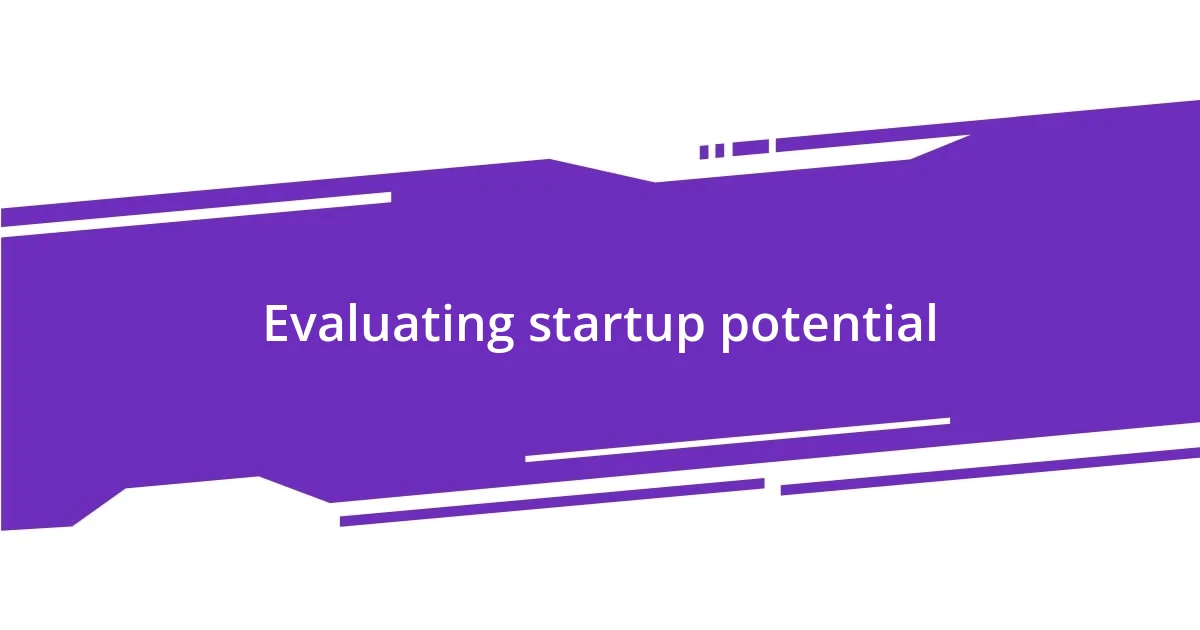
Evaluating startup potential
Evaluating a startup’s potential requires a multifaceted approach. From my experience, I found that looking beyond the product itself is crucial. For instance, during one evaluation, I encountered a startup with a great idea but an unpassionate team. I couldn’t shake off the feeling that without a committed and motivated group driving the project, the chances of success were slim. Would you bet on a ship without a captain?
I learned that market fit is another vital element. Assessing whether a startup’s product addresses a real need can be the difference between a flash in the pan and lasting success. I remember analyzing a startup that had a fantastic solution, but its target audience was unclear. In that moment, it hit me: no amount of funding can save a company that doesn’t know who it’s serving. Reflecting on this, I believe that understanding the user base is not just important; it’s fundamental.
Financials also tell a story about a startup’s viability. I once discussed a budding company with a VC friend, who pointed out how cash flow projections can make or break investor confidence. Their perspective made me realize that even the most innovative ideas can fall flat without a strong business model. Have you ever considered how numbers can convey deeper narratives about growth and sustainability? That’s something worth pondering when evaluating startup potential.
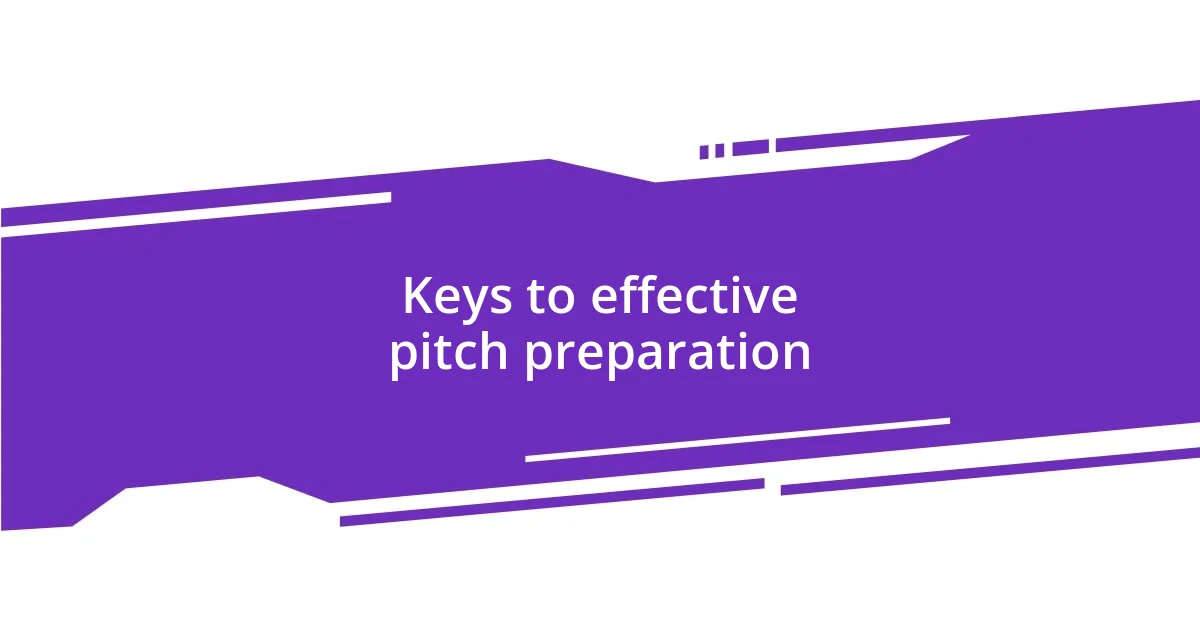
Keys to effective pitch preparation
Effective pitch preparation starts with clarity. I remember once sitting down with a founder who had a fantastic product but struggled to articulate its value. When we broke it down together, we discovered that focusing on a clear problem-to-solution narrative made all the difference. Have you ever tried explaining something only to realize you lost your audience halfway through? That’s why honing your message is essential; it brings everyone along for the ride.
Once clarity is achieved, practice becomes your best friend. I’ve witnessed numerous pitches evolve with rehearsal. A colleague of mine practiced relentlessly, transforming nervous energy into polished delivery. By the time he faced the investors, he was so confident that every word felt natural, drawing in listeners like moths to a flame. Remember, speaking confidently can often sway even the most skeptical minds.
Lastly, I believe that anticipating questions can set a pitch apart. During my early days, I once pitched without preparing for potential investor doubts and it felt like a house of cards tumbling down. Now, I always prepare answers for tough questions, transforming them from potential pitfalls into opportunities to showcase strength and knowledge. Have you ever thought about how effectively addressing concerns can build credibility? It certainly helped me reinforce trust during my pitches.
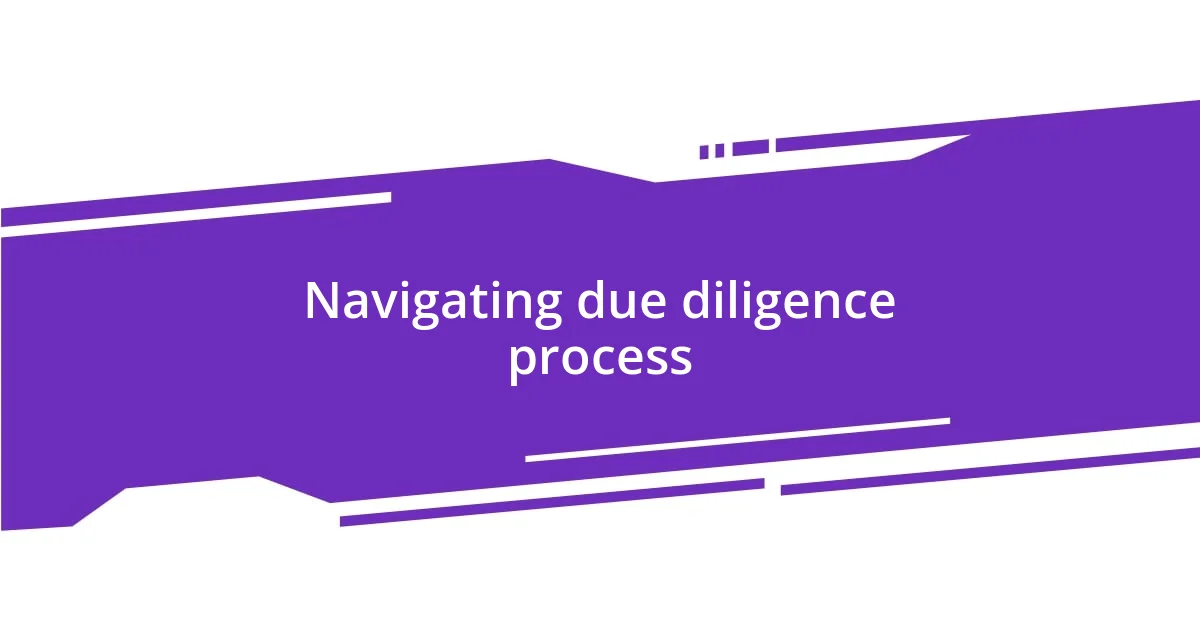
Navigating due diligence process
Navigating the due diligence process is like solving a complex puzzle. I recall a time when I was assessing a startup and felt overwhelmed by the amount of information to sift through. It’s easy to rush through numbers and documents, but I learned the importance of taking a step back to connect the dots—examining not just the financial metrics but also the intuition behind them. Have you ever found a hidden gem by digging deeper into seemingly mundane details?
One crucial aspect I discovered is the significance of team dynamics. During one of my due diligence reviews, I met with the startup’s founders and felt an unmistakable spark among them. Their chemistry and shared vision were palpable—it was clear that they operated like a well-oiled machine. This experience taught me that the human element can outweigh cold hard facts; after all, a passionate and capable team can pivot and adapt when roadblocks arise. Isn’t it fascinating how personal connections can shift the entire landscape of evaluation?
Ultimately, ensuring legal compliance and understanding potential risks is paramount in the due diligence journey. I learned this firsthand when a startup I was interested in had some overlooked legal red flags. It served as a stark reminder: no matter how promising a venture appears, missing these critical pieces can lead to future pitfalls. It left me questioning: how often do we focus solely on the shiny surface while neglecting the foundational truths lurking below? This experience pushed me to approach due diligence with a holistic mindset, scrutinizing every layer for a comprehensive understanding.
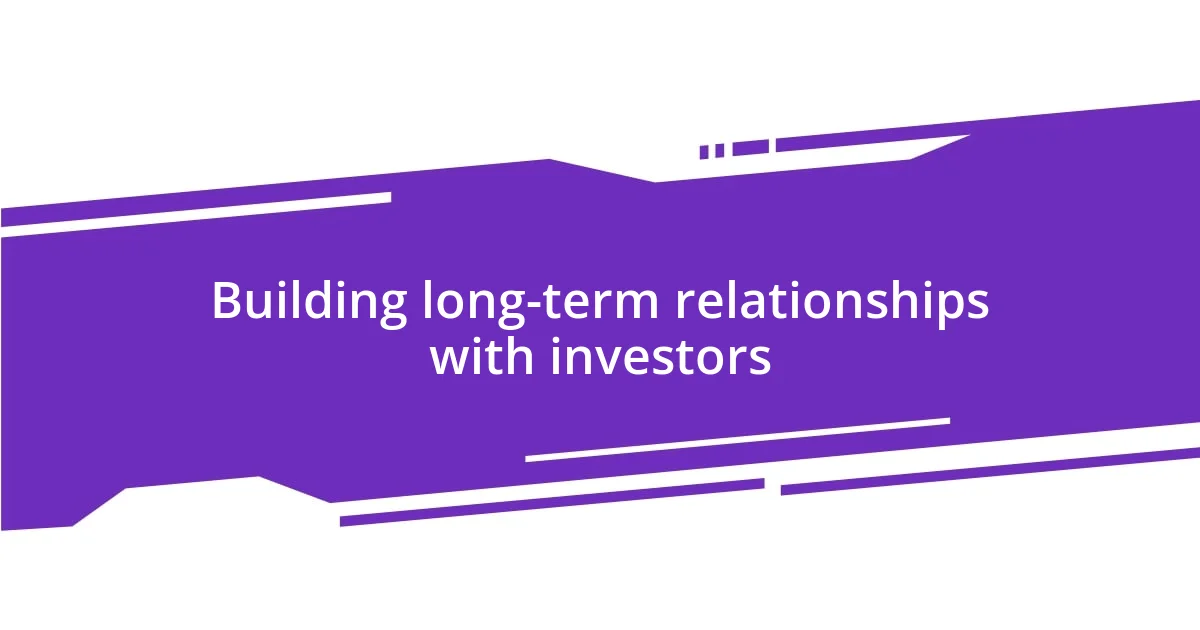
Building long-term relationships with investors
Building long-term relationships with investors requires a genuine commitment to communication. I learned this lesson the hard way during my early days in venture capital. I remember reaching out once every few months to give updates, but I quickly realized that inconsistency led to disengagement. Keeping regular, casual check-ins, even when there’s nothing groundbreaking to share, has fostered richer connections and trust. Have you ever noticed how a simple text or email can keep the lines of communication open?
Trust is really the linchpin of these investor relationships. There was a time when I misjudged how important transparency was; I held back some challenges my startup was facing. It didn’t take long before my investors sensed the lack of authenticity. After that experience, I vowed to share both successes and setbacks. This honesty cultivates loyalty, as investors appreciate your candidness. Anyone who’s built a strong relationship knows that vulnerability can be a strength.
Lastly, I believe in the power of shared vision. Collaborating on a long-term strategy not only aligns goals but also strengthens bonds. One of my best partnerships emerged from a brainstorming session where we crafted a roadmap together. The excitement in that room was contagious, and it reminded me how vital it is to create spaces where partners can dream big. Have you ever been part of a planning session that ignited passion and clarity? It’s those moments that turn investors from mere financiers into invested partners in your journey.











